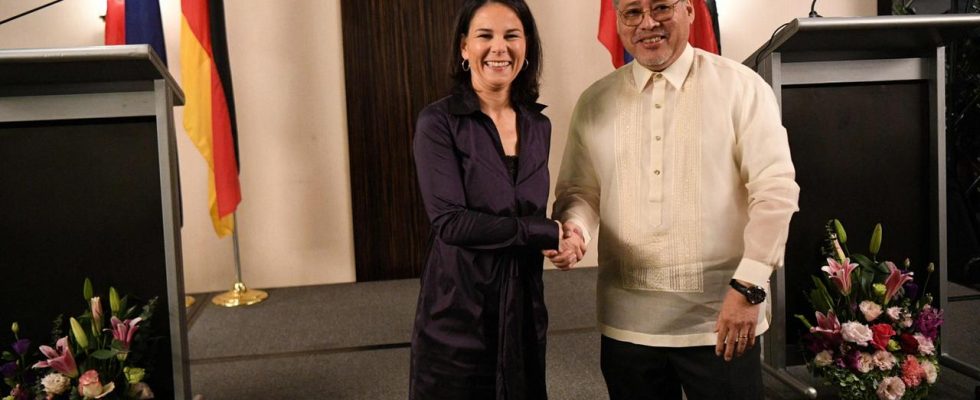Foreign Minister Baerbock has called on China to comply with international law in view of the aggression in the South China Sea. The region is to be stabilized with additional support from the Philippines in coastal protection.
Federal Foreign Minister Annalena Baerbock has arrived in Southeast Asia for a two-day visit. During a meeting with her Filipino colleague Enrique Manalo, she criticized China for its aggressive expansion policy in the South China Sea. The People’s Republic must comply with international law. “Such claims are not covered by international law,” said the Green politician in the capital Manila.
Incidents are also causing concern in Europe
At the same time, Baerbock called for a political solution to the tensions in the region. It is now important to build mechanisms to resolve tensions together in a peaceful manner. “The wind is literally blowing rougher across the South China Sea, right in the middle of one of the most dynamic economic regions on earth,” said the Federal Foreign Minister.
Beijing is questioning the freedom of sea routes guaranteed by international law – in an area through which a third of global maritime trade passes. “The incidents of the last few months, in which the Chinese coast guard used lasers and water cannons against Philippine supply ships and even led to collisions, also concern us thousands of kilometers away in Europe,” said the minister. Such risky maneuvers violate the rights and economic development opportunities of the Philippines and other neighboring countries, she added.
Manalo thanked Baerbock for Germany’s support in advocating for international law at the United Nations. It is necessary to create greater awareness in the international community of the importance of the rule of law and upholding international law in order to create peace and stability in the region and worldwide.
Further support for coastal protection
Baerbock also wanted to visit a Philippine Coast Guard ship in the afternoon. She announced an expansion of cooperation between the two countries on coastal protection. Germany is already supporting the Philippines with reconnaissance drones as part of a training initiative in the Pacific.
Future cooperation will not only involve more drones, but also training and regional cooperation. “This strengthens maritime security and strengthens the rules-based international order,” said Baerbock.
China claims territory for itself
In recent years there have been repeated incidents between China and the Philippines in the 3.5 million square kilometer South China Sea. In addition to geopolitical questions, it involves fishing grounds, raw materials such as oil and natural gas, and the security of sea routes. China claims practically the entire South China Sea as its own. The Philippines, Vietnam, Malaysia, Taiwan and Brunei also claim territory there.
The patrolling coast guards of China and the Philippines regularly carry out dangerous maneuvers there. In October, both countries blamed each other for multiple ship collisions. In August, a Chinese coast guard ship fired at Philippine boats with water cannons and was also said to have used lasers.
The USA and China’s neighbors accuse Beijing of increasing militarization in the region. The International Court of Justice in The Hague rejected China’s territorial claims in 2016, but Beijing ignored the ruling.
Climate protection and skilled workers are also on the agenda
Following the meeting with the Foreign Minister, Baerbock had a conversation with President Ferdinand Marcos Jr. The son of the former president and dictator Ferdinand Marcos won the 2022 presidential election with a large majority.
The minister announced that she wanted to work even more closely with the Philippines on climate protection. The cooperation between skilled workers also holds great potential. Thousands of Filipino nurses did indispensable work in Germany. The minister wanted to visit a training center for technical education where, among other things, mechatronics engineers are trained. In the social sector, around 2,500 nursing professionals from the Philippines have been recruited for Germany since 2013 on the basis of a bilateral agreement.
Gabor Halasz, ARD Berlin, currently Manila, tagesschau, January 11, 2024 10:56 a.m

